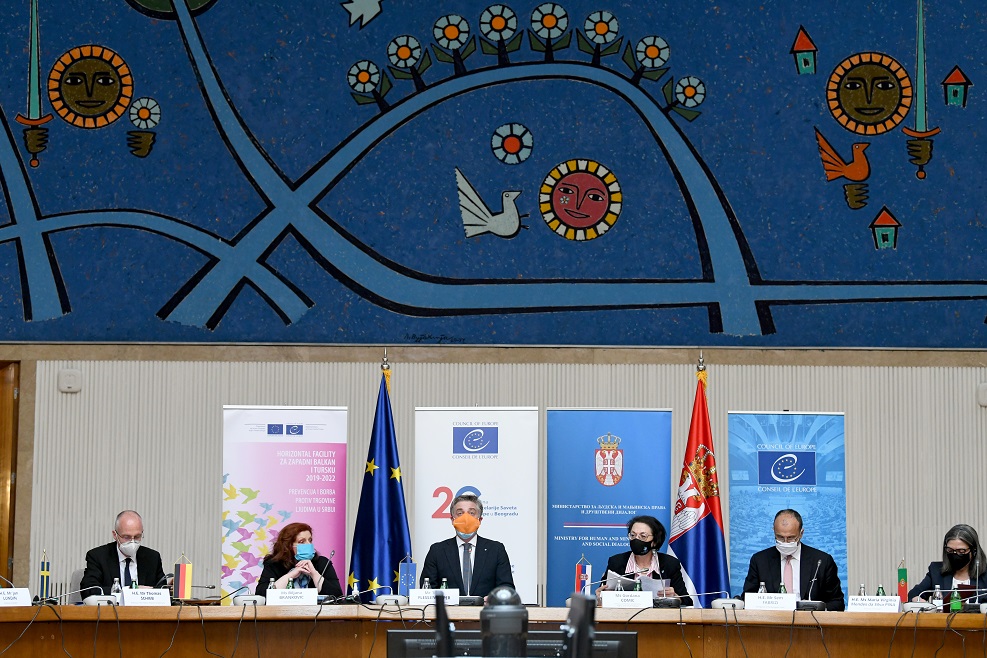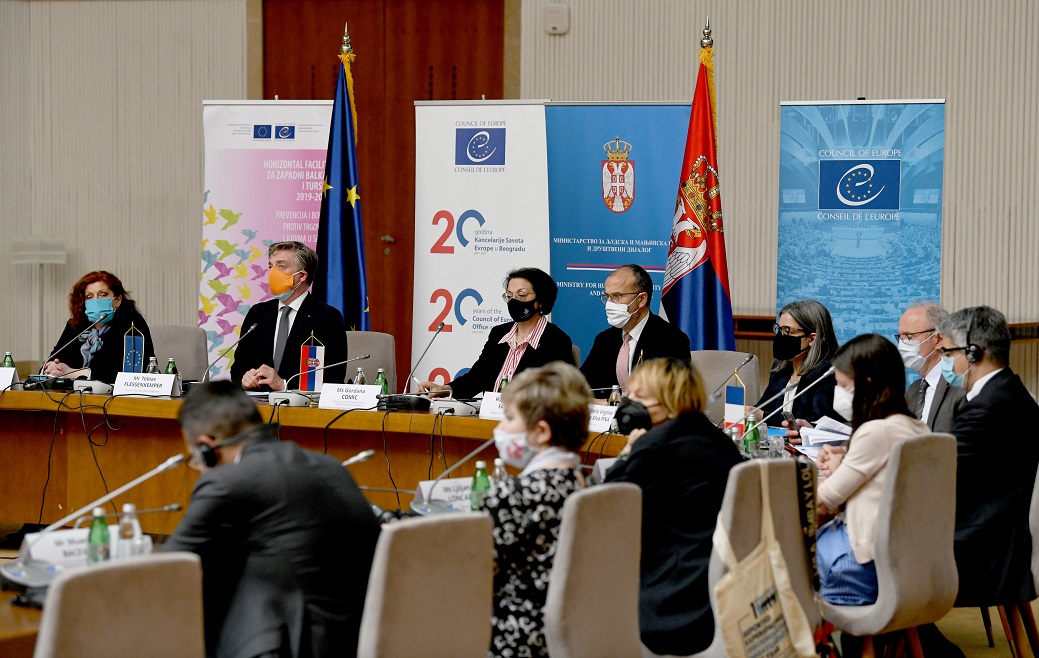7 May 2021 – BELGRADE The 10th anniversary of the Convention on preventing and combating violence against women and domestic violence, better known as the Istanbul Convention, was marked today in a public (hybrid) event in Belgrade, gathering high representatives from the Council of Europe, European Union Delegation in Serbia, public authorities and international community to talk about the importance of the Istanbul Convention and to discuss key achievements and challenges in regards to its implementation.
Tobias Flessenkemper, Head of the Council of Europe Office in Belgrade welcomed the participants and stressed the importance of the Istanbul Convention for keeping women and girls free from violence, despite the challenges imposed by the COVID-19 pandemic. “This landmark treaty of the Council of Europe has created a legal framework to protect women against all forms of violence, and prevent, prosecute and eliminate violence against women and domestic violence. Thanks to the specific monitoring mechanism (“GREVIO”) ways for effective implementation can be identified. The first GREVIO evaluation for Serbia was presented in January 2019. Domestic violence has increased during the pandemic everywhere. That’s why it is even more important to take measures now, increase the budgets for shelters and step up prevention. It is important that all member states ratify the Istanbul Convention and promote it to become a truly global standard. We are counting on Serbia in this effort”, said Flessenkemper in his opening remarks.
Ambassador Sem Fabrizi, Head of the Delegation of the European Union to Serbia addressed the event by tackling the EU Gender Equality Strategy 2020-2025 which highlights the disproportionate effect of digital technologies on equality, work life balance, unequal share of care responsibilities, as well as focusing externally on green and digital transformation. “Although no country in the world has yet achieved full gender equality, Europe is globally a pioneer of gender equality and that is something we should be proud of. The EU is fully aware that violence against women constitutes a major obstacle to gender equality, one of the EU’s fundamental values. Our commitment and concrete actions are essential but extra efforts are required from each and all of us“, stressed Ambassador Fabrizi.
In her statemnent, Biljana Branković, Member of the Monitoring Body of the Istanbul Convention – GREVIO, focused on the impact of the Convention for its members and what it has changed in the lives of real women. “We as GREVIO published baseline evaluation reports on 17 countries so far. It turned out that none of these countries managed to fully meet the Convention’s requirements, but each of them made progress, often, a significant progress, in “translating” its norms into reality. Countries of Western Balkans, for example, including Serbia, amended their criminal legislation, adopted dedicated laws on domestic violence and introduced emergency barring orders. Policy makers must have a vision. The Convention offers that vision”, she concluded.
“Istanbul Convention is the best tool to most efficiently decrease domestic violence and violence against women, thus creating better living conditions and consistent respect for human rights culture, stated Gordana Čomić, Minister of Human and Minority Rights and Social Dialogue of Serbia in her speech.
The meeting continued with the remarks from H.E. Thomas Schieb, Ambassador of Germany, on behalf of the Presidency of the Council of Europe Committee of Ministers, emphasizing that the Istanbul Convention is the most far-reaching legal instrument we have to prevent and combat violence against women, as well as to ensure protection for victims and bring perpetrators to justice. “This is today more important than ever, as violence against women and girls has increased worldwide as a result of the many conflicts where women are the primary victims, and in particular, in connection with the COVID-19 pandemic”, he stated.
H.E. Virginia Pina, Ambassador of Portugal, on behalf of the Presidency of the Council of the European Union in her statement stressed that Portugal condemns any form of violence against women and girls and gender-based violence, online and offline, including sexual and domestic violence. “These human rights violations represent major obstacles to the realization of women’s rights and to the promotion of gender equality, hindering women’s full, equal and meaningful participation in all spheres of public life.”, she said in her remarks.
Johanna Nelles, Executive Secretary of the Istanbul Convention Monitoring Mechanism in her address focused on the main achievements and challenges during the 10 years of the implementation of the Convention. “The Istanbul Convention is inspiring changes in legislation, in budget allocation, and in the number and types of services that are available for women who experience rape, domestic violence, stalking, sexual harassment or other forms of violence. Monitoring its implementation shows how and where and the trends that have emerged over the past 10 years.”

The event continued with an open discussion on the efforts of the public authorities in Serbia towards the proper implementation of the Istanbul Convention aiming to ensure continued progress in ending all forms of violence against women and girls.
Serbia joined the Istanbul Convention in 2014 and the treaty today binds 34 countries across Europe. In its first report on the implementation by Serbia of the Istanbul Convention published early last year, the Council of Europe’s expert body GREVIO recognised the commitment of the Serbian authorities to eliminate gender-based violence and the significant progress made in legislation and practice. Nevertheless, additional efforts are yet needed to ensure a more comprehensive response to all violence against women covered by the Istanbul Convention, including rape, stalking, sexual harassment and forced marriage.
The event is organised by the Council of Europe Office in Belgrade in co-operation with the Ministry of Human and Minority Rights and Social Dialogue of Serbia, with the support of the joint European Union/Council of Europe action “Preventing and combating trafficking in human beings in Serbia” which is a part of the joint European Union/Council of Europe programme “Horizontal Facility for the Western Balkans and Turkey 2019-2022”.